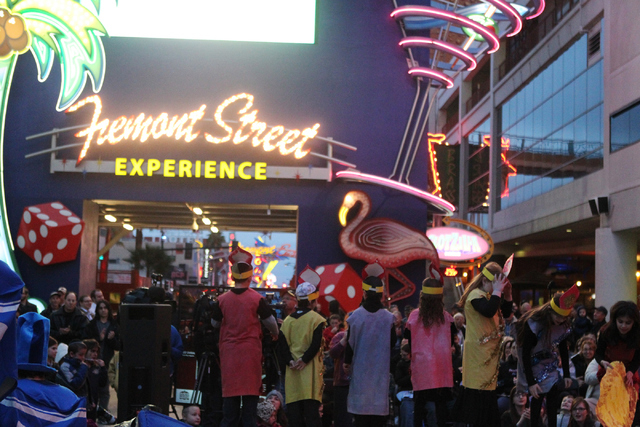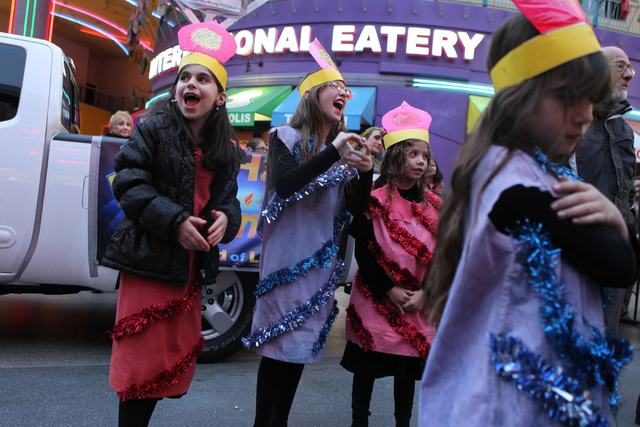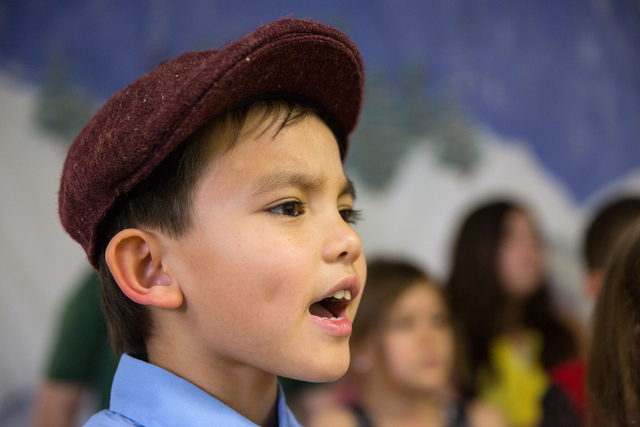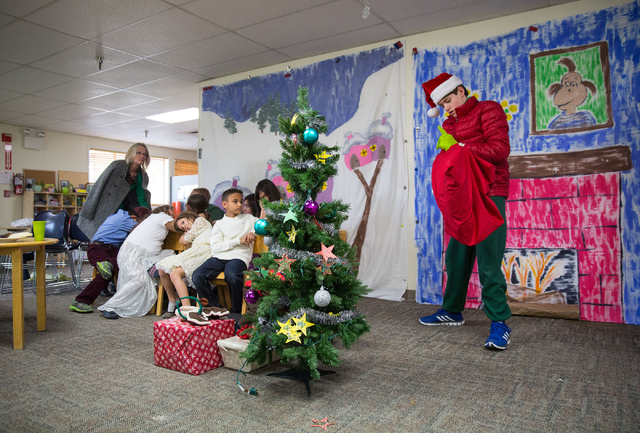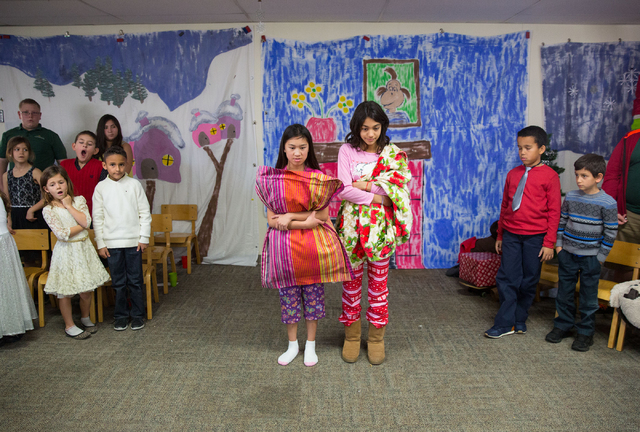Holiday fuss can cause stress for kids
For children, the holidays can be both joyous and restless.
As presents multiply under the tree and the anticipation builds, a dizzying multitude of demands — parties, shopping, baking, cleaning, entertaining and financial burdens — can weigh on parents and caregivers.
The unintended recipients of this household stress often are children. The younger the children are, the more susceptible they are to lacking the rest or nutrition they need.
“One of the things that happens at Christmas is things get chaotic, and the children begin to sense that chaos,” said Patricia Meye, founder of Renewing Life Center in Las Vegas, which provides individual, marriage and family counseling from a Christian perspective. “It is a time that has potential for depression, anxiety, additional pressures because of finances, people traveling, visiting family members and friends, two to three family units coming together.”
Stress in children can cause physical symptoms such as changes in eating habits or headache, or emotional or behavioral symptoms including anxiety, clinging, aggression or an unwillingness to participate in family or school activities. Doctors and therapists suggest parents and guardians remember routines, plan for rest and balanced meals, and listen to their children.
“When you’re engaging your child, there is so much learning going on,” said Dr. Justin Maxwell, a Las Vegas family practitioner with HealthCare Partners Nevada. “Some people don’t know the importance of spending time with their children.”
Kids suffering the effects of stress can come to Good Night Pediatrics, an all-night urgent care facility in Henderson, at any time, but the issue builds to a crescendo during the weeks before Christmas, according to Dr. Lisa Miller, a pediatrician at the clinic. Children under stress can complain of stomachaches, random aches and pains, and difficulty sleeping.
Sometimes, the symptoms manifest in regressive behaviors such as temper tantrums, Miller said. A child, long since potty trained, might start wetting the bed. Other behaviors include nail biting, hair twirling, crying in frustration or fighting with siblings.
Parents occasionally bring their children to the clinic concerned about the effects of stress alone, but more often stress is diagnosed as a complicating factor to the child’s main health issue, Miller said.
“Children don’t handle stress the way we do,” she said. “As parents, we feel like we control our own world. Kids don’t. They don’t have a lot of control. That’s part of their stress is not having control.”
Following certain tips can help ensure a happier holiday and help parents and children avoid the stresses of the season.
Miller recommends maintaining the child’s routine as much as possible: mealtimes, storytimes, bedtimes. When traveling, he suggested, have the child take a favorite pillow, stuffed animal, blanket or sweater to provide familiarity. Avoid fast-food outlets and seek meals with more nutritional balance.
Consistency isn’t just for home. Every year for the three weeks after Thanksgiving, teachers are challenged trying to keep their charges focused on learning. Montessori Visions Academy, with campuses in Las Vegas and Henderson, is designed for infants through 12th grade, and employs an educational method that structures the environment and learning in an individualized way.
Not even the Montessori method, however, is immune to the holiday hubbub.
“In giving lessons, they’re much more easily distracted, and there’s much more talking about events outside of school,” said Linda Khalil, the assistant director of the academy, which also offers after-school programs.
Khalil and her colleagues work during the holidays to keep things consistent for the pupils, maintaining an orderly and attractive educational environment. Parents are instructed to prepare their children for changes to routines. For example, there might be days kids stay longer at school so mom or dad can run errands or shop for presents.
“Our parents are very well aware of the fact that the children need to be informed,” Khalil said. “It still is a disruption in the routine, and that can become a source of stress for them.”
The academy’s educators also expose the students to service organizations to show them the holidays are a time of giving, not just receiving. The Montessori kids visited a workshop at Opportunity Village, a nonprofit serving Southern Nevadans with intellectual disabilities, and they helped serve a meal at Ronald McDonald House Charities of Greater Las Vegas, which supports families receiving medical treatment for their children.
Embracing traditions can help families mitigate holiday stress, experts say. Christians can focus on the story of the birth of Jesus. During Hanukkuh, children are taught what it means to be Jewish. African-Americans celebrate Kwanzaa from Dec. 26 to Jan. 1, an observance patterned after African harvest festivals.
Health care ideally is delivered with respect to a patient’s whole person — physical, emotional, social and spiritual. The social and spiritual aspects of care often take a backseat to the physical and mental, but clinicians can sometimes incorporate spirituality into medicine for children with holiday stress.
Spirituality in and of itself can bolster a person’s well-being, research shows, because the exercise and practice of any faith can decrease stress. Teaching children to honor their heritage also can strengthen feelings of peace, safety and well-being.
The traditions of the season involving food, music and gift-giving enrich the soul and form the basis for kids to cherish the holidays for the rest of their lives, experts say.
“If we don’t, as parents, show our kids that these are the gifts of Christmas, we’re missing the gifts that last. Order, tradition and love last,” said Meye, the counseling center founder. “They can hang meaning on those traditions, and they find themselves in the midst of those traditions.”
Dina Harlig, director of Desert Torah Academy, a school of 250 students starting with 1-year-olds to eighth-graders, said her students have been donating toys that will be distributed to deserving Jewish families. The practice shows the kids how to think of others, and the activity has created a buzz at the school at Charleston Boulevard and Vista Drive in Las Vegas.
“I don’t call it stress. I call it positive energy,” Hartig said last week at the lighting of the Hanukkah menorah at the Fremont Street Experience. “It’s a matter of how you present it to the kids.”
The activity, Hartig says, makes the season a little brighter.
“A little more light drives out a little more darkness,” she said. “If every person does just one good thing, it creates a lot of good will.”
Contact Steven Moore at smoore@reviewjournal.com or 702-380-4563.
Getting Help:
Children, even very young ones, have worries and feel stress. Talking with kids about how they feel can help manage their time and lessen the anxiety. At the holidays:
■ Be present, don’t just give presents.
■ Make traditions your target.
■ Stress the lasting gifts of the season, not the stress from the hustle and bustle.







